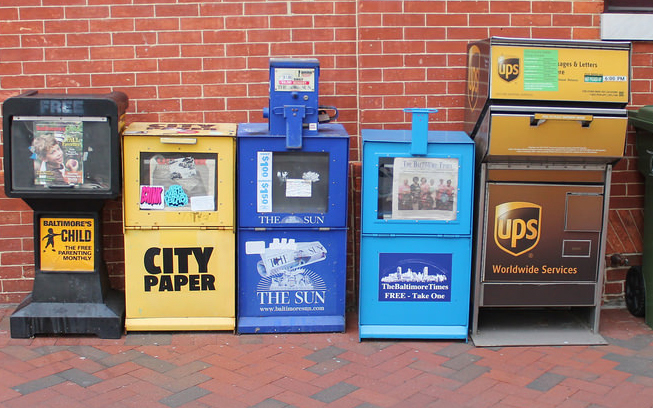
Due to declining ad sales, the Baltimore Sun Media Group (BSMG) announced it will close City Paper at the end of the year.
“Like many alternative weeklies across the country, declining ad revenue at City Paper continues to be a challenge,” said BSMG’s director of marketing Renee Mutchnik in a statement. “It became clear to us this past fall that we would cease publishing City Paper sometime in 2017.”
Although a specific date for the closure and future of the employees is still being finalized, the editorial staff at City Paper learned of the news in June.
“We were trying to hold off announcing it because, well, it’s very sad, but also because I’m not sure about how this is all going to play out,” said City Paper editor Brandon Soderberg in a statement. “I’m half-convinced this won’t be the end of the paper and someone will swoop in and buy us.”
Soderberg and his staff started an Indiegogo campaign, asking supporters to fund the paper’s future journalistic endeavors. However, BSMG asked him to remove the page.
“It was removed because it’s not really the way for a for-profit paper under Tronc to make money, which makes sense,” he said. “It potentially introduces some ethical concerns . . . So I refunded the money we’d made after 12 hours—almost 900 bucks!—and deleted the campaign.”
Founded in 1977 as City Squeeze, the free, unapologetic alt-weekly paper targets a younger audience attracted to a more contemporary style of news coverage. In 2014, the BSMG (under parent company Tribune Publishing, or Tronc) purchased City Paper from Times-Shamrock Communications, which had owned the weekly for more than 20 years.
Just this year, the paper’s editorial coverage has been lauded, winning several MDDC Press Association awards, and being named a finalist for two Association of Alternative Newsmedia (AAN) awards.
Despite the closing, Soderberg is determined to maintain the paper’s coverage of news, arts, and politics as long as it has the means. But severe cuts to the freelance budget will force the editorial staff of 10—eight full-time, two part-time—to carry a heavier load.
“What bums me out is not being able to have those voices in the paper,” he said in an email. “The paper was always bigger than its staff, you know?”
City Paper blogs editor Brandon Weigel said that, while he understands the difficulty of journalism as a business, it still shocks him that the paper is closing.
“The outpouring of support shows that people still care about what we do and will miss it,” he said in an email. “We have never had the resources of some of the bigger outlets in town, but we’ve always covered stories with depth, voice, and passion. And we’ve written about things other places didn’t, or at least in a way they wouldn’t.”
The paper was not only an outlet for progressive news in Baltimore, but also a place for novice writers to wet their feet in the sea of journalism. Soderberg says that it was City Paper that gave him his first professional writing job in 2007.
“I wrote for the paper for seven years until I got hired. It was some extra money for me,” he said. “It was also being part of the tradition, affecting that tradition, adding to it.”
Morgan State University journalism professor Milton Kent said that it is unfortunate that the city is losing another media outlet, especially one that has been instrumental in grooming new journalists.
“City Paper has been really good about providing internships for my students, so having that outlet disappear is not encouraging,” Kent said. “Every city needs a news organization that covers areas of a city that the mainstream doesn’t cover. That’s what their mission has always been.”
Like many print publications in recent years, City Paper has experienced declines in classified print advertising sales, and was forced to rely on online revenue to make up the difference. Other news outlets like Philadelphia City Paper and Baltimore-based SmartCEO magazine have shuttered their doors for similar reasons.
“I’m not sure what will come next or when,” Weigel said. “But I can walk out of here knowing I got some amazing opportunities and worked with incredible people.”
Of course, the repercussions of losing an alternative weekly in a major city go well beyond the current staff and will have a long-term ripple effect on the media landscape as a whole.
“Specifically, it means one less progressive voice,” Soderberg said. “We’re inching towards a media desert here. Where will writers learn and find their voice without us around?”
